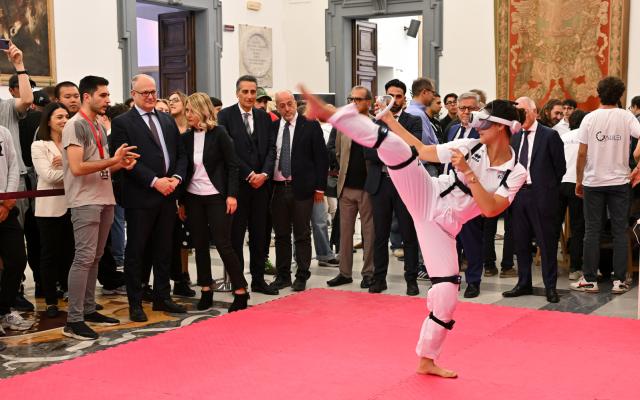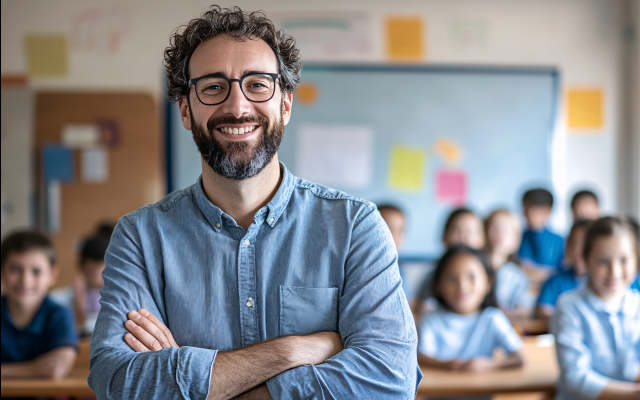Chip Camp, an educational workshop combining AI, logic and prototyping for Generation Z
Five days of discovery, experimentation and collaboration to introduce young people to the world of semiconductors, programming and emerging technologies. This was the experience of 25 students aged between 12 and 14, thanks to the Chip Camp in Naples “Inside the Future”, a free summer camp organised with the Micron Foundation, designed for secondary school pupils from vulnerable social backgrounds.
An accessible, immersive and career-oriented educational programme
The project was born with a clear vision: to make science education accessible and concrete, focusing on active involvement and learning by doing. No prior knowledge was required, just a desire to explore. In creative workshops, the students learned how a chip works and built simple circuits, guided by university trainers and enthusiastic teachers.
The activities involved two comprehensive schools in the Pianura district (Municipality 9 of the City of Naples), 72° Palasciano and Ferdinando Russo, which combined resources and spaces to host the young participants.
Among the most popular activities were
- The “semiconductor scavenger hunt”, to discover chips in everyday objects
- The experiment with lemons, natural conductors in mini-circuits
- The construction of a simulated “Smart Room” with Arduino
- The creative workshop to “make a wafer” with food materials
Managers and teachers: the school as a space open to technology
The headteacher of Palasciano, Maria Luisa Salvia, emphasised how schools must open up to new and diverse educational experiences that can bring out hidden potential: “We don't know where talent lies, and we have a duty to offer as wide a range of education as possible. This project has been fundamental in sparking curiosity, offering skills and creating opportunities”. She also spoke clearly about the structural shortcomings of the area: a neighbourhood with no cinemas, theatres, free sports centres or secondary schools. This educational and social void can become fertile ground for school dropouts or, in the worst cases, crime. ‘Experiences such as Chip Camp help young people to get out of the house, get involved and discover passions and skills that sometimes remain hidden at school.’
On the same wavelength, headteacher Antonella Portarapillo of IC Ferdinando Russo highlighted how Chip Camp represents an effective and concrete response to contemporary educational challenges: “The opportunities offered by digital education represent the real challenge for the new generations and for Italian schools. Now more than ever, schools need to be renewed, not only in terms of their environment, but also with a view to lifelong learning”.
The enthusiasm and interest shown by students and parents were a concrete indicator of the project's validity. The headteacher received positive feedback throughout the week: ‘We had a high turnout and everyone was very engaged. Many parents asked to continue with similar activities during the school year, as a way to support teachers in the classroom. It would also be interesting to extend these courses to adults, parents and grandparents.’
Professor Giorgio Ventre, scientific director of the Apple Developer Academy and guest at the camp, reiterated the central role of schools in bridging the gap between skills and professional future, while denouncing a still marked divide: “Female participation in this type of course is still too low, especially in the south. This is a huge loss, because girls have creativity and commitment to spare. We need a joint effort by schools, families, companies and associations”.
Voices from the camp: the impact on students
The boys and girls themselves also spoke about the value of the project. Alessandro, 13, found Chip Camp a way ‘to express emotions with technology and get involved.’ He has always been passionate about computers and takes things apart and fixes them at home with natural curiosity. David was fascinated by the energy hidden in lemons. Mattia, on the other hand, enjoyed the experiment with cables connected to a USB port to turn on a mini “traffic light” lamp. Sonia, 12, discovered Arduino and now feels “better prepared” to use technology in an informed way. Fabio, 14, confirmed his desire to study computer science in high school. Gianfranco appreciated the group work on the presentation and the opportunity to present the work in front of the class.
The relational dimension made the difference. As Luisa Fucito, a teacher at IC Russo, explains: “I saw the children interact, overcome their initial mistrust and form working groups and friendships in a matter of minutes. Beyond digital skills, the human value was enormous”.
Ludovica Canzano, a teacher at IC Palasciano, also saw a positive sign in the growing involvement of girls: “They participated enthusiastically, contributing ideas and solutions. This is an important step towards overcoming the stereotypes that still link technology to a predominantly male world”.
A new digitally aware generation
The Chimp Camp Napoli project was also a training opportunity for the young university trainers involved. Fabrizio Bove and Luigi Di Giovanni, computer science students at Federico II University in Naples, led the workshops with great passion.
"We combined theory and practice. The kids were involved, they asked questions, they even did research at home. They didn't just listen, they wanted to understand, experiment and build. This is how active and conscious knowledge develops," said Fabrizio.
Chip Camp was useful not only for the skills acquired but also for the contagious enthusiasm and confidence in their own potential that was generated among the young participants. This is the spark that Fondazione Mondo Digitale intends to ignite in all its projects: the spark that transforms technology into a tool for redemption, growth and freedom.
‘Many of these young people will do jobs that don't even exist today,’ said Salvia. ‘And when that day comes, I hope they will remember that someone, many years ago, believed in them. And planted a small seed.’
Alberta Testa followed the event for Fondazione Mondo Digitale and conducted the interviews. She also shared her perception of the experience with us: "It is places like Pianura, the suburbs, the South, often portrayed with an emphasis on fragility rather than potential, where our work has the most visible and profound impact. Here, young people participate with enthusiasm, curiosity and openness. Like sponges, they absorb every stimulus, ask questions, experiment, put themselves out there and show genuine curiosity about the content offered. The role of the trainers was also decisive. They approached the natural liveliness of the group not as a classroom management problem, but as an opportunity to build a relationship based on mutual recognition. They were able to present themselves in a horizontal manner, as credible and accessible interlocutors, always maintaining a balance between proximity and authority.


